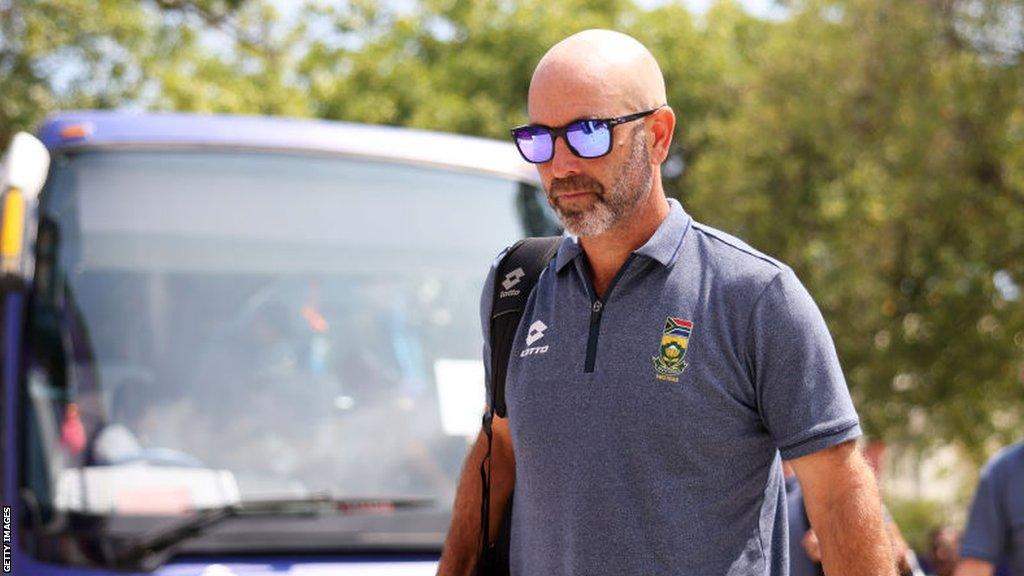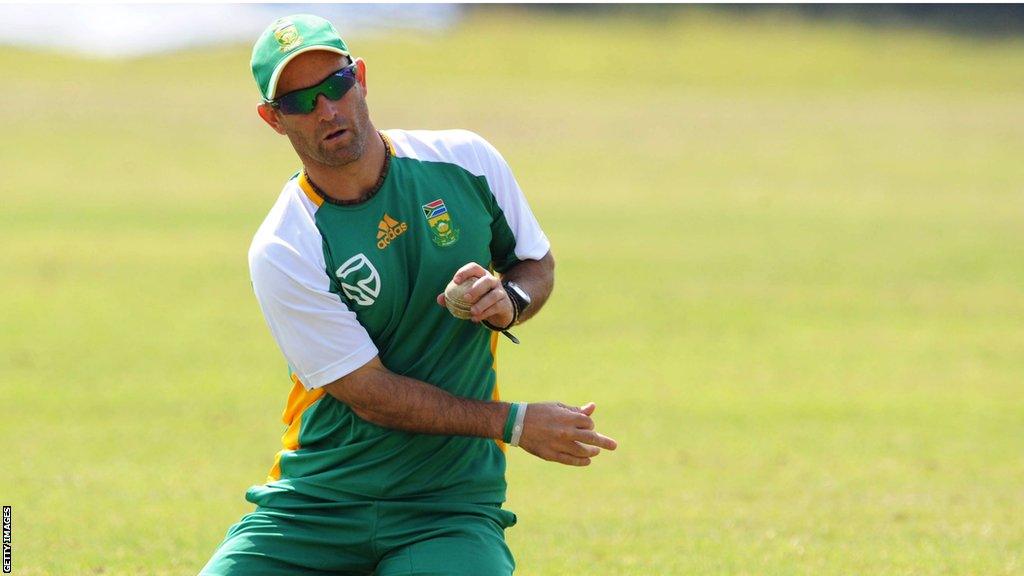Cricket World Cup 2023: South Africa coach Rob Walter's journey to semi-final
- Published

South Africa split their coaching roles in January - Rob Walter becoming white-ball coach and Shukri Conrad taking the Test team
ICC Men's Cricket World Cup: South Africa v Australia |
|---|
Venue: Eden Gardens, Kolkata Date: Thursday, 16 November Time: 08:30 GMT |
Coverage: Ball-by-ball Test Match Special commentary on BBC Radio 5 Sports Extra, BBC Sounds and the BBC Sport website and app. The website and app will also have live text commentary and in-play video clips (UK users only) |
Three of the four coaches leading teams in this week's World Cup semi-finals played for their country.
India's Rahul Dravid, Australia's Andrew McDonald and New Zealand's Gary Stead followed a well-travelled road to the top.
The fourth did not even play cricket professionally.
He does not have a Wikipedia page and has not tweeted for more than a year.
In fact, South Africa head coach Rob Walter started out as a strength and conditioning coach - an S&C to use the modern phrase - rather than the main man.
Where India legend Dravid is one of the biggest names in the country, a man on TV commercials and billboards everywhere you go, Walter is cricket's mystery leader.
Most at this World Cup would not know if they passed him in the street.
The 49-year-old from Johannesburg was appointed to lead his home country in white-ball cricket earlier this year, having previously been the Proteas fitness chief from 2009 to 2013.
Back then South Africa were ranked number one in all formats, their team packed with Protea legends such as Graeme Smith, AB de Villiers, Jacques Kallis, Dale Steyn and Morne Morkel, and led by Gary Kirsten.
Walter was there in the background. Always watching. Always learning.
"I remember distinctly whenever we had team meetings, he would always be at the back of the team room with his notebook," says JP Duminy, the former batter who was also in that squad and is now Walter's batting coach with South Africa.
"Whatever conversations we had, he was making notes, the nuggets he felt were useful."
Walter, whose cricketing career topped out as a decent schools player, would scribble down tactical discussions and details on how Kirsten dealt with certain players or situations.
Afterwards he would take photos of the flipcharts that stood at the front of the room.

During Walter's first spell with South Africa as fitness coach they became the first team to top the International Cricket Council (ICC) rankings in all three formats
During that period Walter also worked at Indian Premier League sides Pune Warriors and Delhi Daredevils, rubbing shoulders with more greats of the game.
In 2013 he was appointed head coach of the Titans in South Africa. It was a leap of faith for Walter, but even more so for Titans chief executive Jacques Faul, who had to fend criticism from all angles.
"We got drilled," he says.
"I got a lot of phone calls. They said you can do three stupid things in your life but now I only have two left.
"You have just appointed, for Titans who are big franchise in South Africa, someone who has never coached."
Before making the decision, Faul called Kirsten, who gave Walter a glowing reference. Walter still had to pass his interview, with other more established names, including some from overseas, in the frame.
"The first question was, 'You have never coached or played - why would players buy into your plans?'" Faul says.
"He had a good explanation for why.
"He said he was in that Protea dressing room and knows what to do. You must trust him.
"He has a way of being confident without being arrogant. That struck me."
In three years with the Titans, Walter won four trophies. He signed Heinrich Klaasen, Tabraiz Shamsi and Lungi Ngidi, and gave Aiden Markram his debut - all players who are now part of his World Cup squad.
It was Walter who persuaded Klaasen not to quit after a difficult early career. Klaasen is now one of the most destructive white-ball batters in the world.
Speak to those who know Walter and they all describe him the same way - a people person.
They say he is collaborative, has a scientific approach to coaching - he introduced a sleeping section to the Titans dressing room - but above all has an awareness that no two players are the same.
It goes back to his S&C days where he motivated fast bowler Morkel, then a gangly fast bowler from club cricket, in the gym with the prize of free holidays, while with Duminy, a self-confessed "lazy" kid at that stage, he used the drill sergeant approach.
Walter left Titans to test himself in entirely new surroundings, travelling 7,000 miles to take a head coach role with Otago at the southern tip of New Zealand.
There he struck up a bond with Hamish Rutherford, the New Zealand international who would be his captain.
"I have had a few coaches but he is my favourite," says Rutherford.
"He is a genuine bloke who properly gets to know his players and how they tick.
"He came at a challenging time at Otago and really changed it around, created a new culture we were desperately craving."
On the field Otago reached two finals, but Walter left a lasting impression with the structures he implemented. Off it, he surfed and played golf with Rutherford.
"There was one summer when I thought I was the next Kelly Slater," says Rutherford - a reference to the American 11-time World Surf League champion.
"He hates beer.
"If you ever did something well or the team won he would have the tiniest measly sip of beer to say well done but didn't enjoy it one bit."
Throughout his career Walter's lack of elite playing experience has never seemed to hold him back. He is described as a "cricket tragic" but if there is something he doesn't know, he is happy to lean on others who do.
"I did some short ball work with him," says Rutherford.
"I had had a few concussions at that time. He rang up JP Duminy and Gary Kirsten to see what their opinion was and we made a plan.
"You would never know he hadn't played. You just believe him."
Walter's teams have developed a reputation for making big totals.
In 2017 his Titans side scored 425-5 batting first in the 50-over cup final. Three years later, Otago also broke the 400 barrier with 407-4 against Central Stags - Rutherford hitting 155.
At this World Cup, South Africa hit 428-5 - the highest score in the history of the tournament - in their first game against Sri Lanka and backed it up with 399-7 against England.
"We had never-ending conversations about trying to ramp up my one-day game," says Rutherford.
"South Africa are playing with a lot of freedom and look well connected.
"A lot of that I am sure would come from him, knowing the way he operates."
He has been on the long route to get here and Thursday's semi-final against Australia is the next stop on Walter's way.